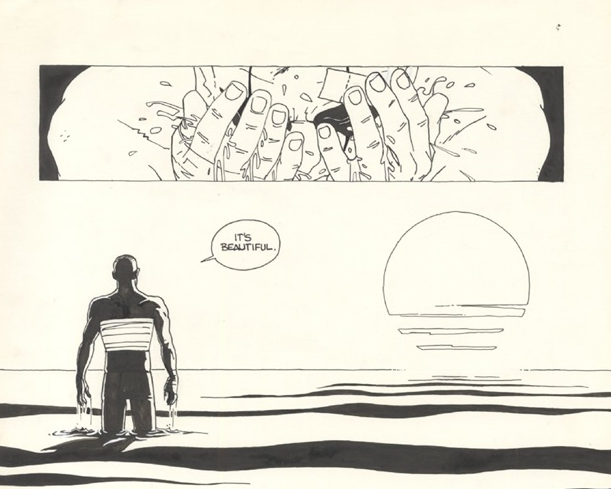Illustrated by Jonathan Luna
Image Comics
When I was a kid, there was a whole list of things I thought I would see by the time I was a grown-up. Chief among them was flying cars, but the other thing I kind of thought we'd have more of now is robots/androids. There of course have been many books, movies, comics and other forms of media regarding androids, robots and cyborgs, and many of them had an apocalyptic feel to them (see "Terminator," "Matrix," "I, Robot" - actually don't see "I, Robot"). But what about scenarios other than the worst case, doom-and-gloom scenario? What would our world look like if artificial intelligence (AI) were relatively commonplace? Alex + Ada tries to answer some of those questions; more importantly, it focuses on telling a compelling story.
Everything in this story is well-crafted, and the art by Jonathan Luna really helps to set the mood. I hesitate to use the word "clean" to describe the artwork but here it makes sense. From a design perspective, the future depicted here looks a lot like an Apple Store meets an Ikea (sterile and a little cold). The technology is beautiful and seamlessly integrated into people's lives. The art here is subtle, but expressive (you get almost repeating panels where the dialogue moves the story along). There's a lot of solid colors and not a lot of shading or rough lines. It's friendly, accessible art, even for those who don't read comics regularly.
This story is set in a recognizable future, where there are big differences (self-driving cars, AI, "telepathic" technological communication both between people and between people and their technology) but many similarities. Houses, cars, people look basically the same. When we first meet Alex, he's sad and lonely as he's still depressed about the girl that left him. He has a number of friends who try to cheer him up on his birthday, but to no avail. Alex's funny, blunt, sexually frank grandmother decides to buy him an android for companionship and maybe sex (you know, just like your grandparents bought you for your Bar Mitzvah) and by the end of the first issue, we see the android, and she's a beautiful "perfect" woman.
Over the next few issues, Alex wrestles with whether to return the android (whom he names Ada) to the manufacturer (spoiler alert, he doesn't), and then he awkwardly, hesitantly tries to get to know Ada by himself and with the help of his friends; the scenes with Alex's friends interrogating Ada are hilarious and feel very down-to-earth. The story here takes an interesting direction, as Alex finds himself going from being reluctant to keeping Ada, to being disappointed that she's not more "real". She doesn't have much of a personality of her own, and Alex is dissatisfied with this. So dissatisfied, in fact, that he decides to do some investigating.

In the current issue, Alex's quest to learn more leads him to the discovery that, much like when you "jailbreak" an iPhone, it's possible to unlock hidden features and applications in your android. He discovers this in an amusing trip to an online forum (using virtual reality technology which seems to be pretty commonplace in the world of this story). However, jailbreaking your android is not without risk (which owners of any android phone can tell you, ba dum bump)*.
There's a lot that's great about this story. It looks beautiful, and very different from a lot of genre comics - the sparse, utilitarian art helps to set an advanced, slightly cold future, but a completely recognizable feel. The world is a fully-realized one, as Luna and Vaughan have done a lot of world-building. It's clear that androids are viewed with significant trepidation, as there have been a number of violent incidents relating to androids.
What's most well-crafted here are the characters. Although the specific technological questions that Alex is wrestling with are different than those in our own world, his sense of loneliness and alienation feels entirely relatable, and his interactions with Ada are stumbling and sweet. The story moves at a deliberate pace, unlike your typical action or science fiction story where the character interactions can sometimes feel secondary. Here, the relationships and the emotions are the story. For a comic about an android, there's a lot of humanity in this book.
Alex + Ada does what great science fiction does (and ought to do), which is to use futuristic ideas to shine a light on the present while telling an interesting, believable story. Everything the characters experience regarding futuristic technology is an astute commentary on the technology we have now, the ways people lose themselves in it, and the (perhaps unrealistic) expectations we have about the way technology (and material possessions generally) can make us happy. If you like movies such as "Her" or "Gattaca", then this book is definitely worth a look.
*Editor's note: I was actually going to insert that joke. Luckily for me--but maybe not for our readers, James already did. -RobM







